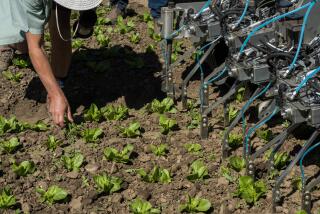Engineered Crops Yield Many Fears
- Share via
Some 80 million acres of genetically engineered crops were planted in the United States in 1999, including 55% of the soybeans and 35% of the corn. These crops have found their way into an estimated 60% of all the foods in the supermarket.
Californians, like all Americans, have been deluged with claims about the wonders of genetically modified organisms in agriculture. These claims include assertions that genetic engineering is merely a continuation of selective breeding that farmers have been engaging in since the dawn of civilization; that increased productivity will allow us to feed the world’s starving; that biodiversity on the farm will increase, thanks to reduced use of hard pesticides; and that genetically engineered crops and food are adequately regulated to protect the health and safety of consumers.
All of the above claims are speculative or false. Consumers and farmers alike should beware the expensive propaganda of the ag biotech industry. Here’s why.
Genetically engineered crops are not a continuation of the plant and animal breeding that farmers have always done. These products are created by inserting a gene associated with a desired trait (tolerance of the cold, resistance to insects) into the DNA of an agronomic crop, frequently across species boundaries (from a Brazil nut into corn, for instance, or from a human into salmon). This is not the same as breeding plants by selecting naturally occurring characteristics, or breeding two different hounds. It’s the very fact that these products are “unnatural” that gives rise to reasonable concerns about their impacts on the environment and human health.
The world’s poor are hungry not because of the absence of food but because of the absence of money to buy the food. A look at the results of the Green Revolution (the introduction around the world of “improved” varieties of crops that have higher yields but require petrochemical fertilizers, pesticides and, often, irrigation) shows that increased production paradoxically leads to more, not less, hunger. Hunger results from the concentration of economic power, exacerbated in poor countries by the introduction of industrial farming for export, as subsistence farmers are driven off the land.
In any case there’s no guarantee that genetically engineered crops lead to increased production; Roundup Ready soybeans, for instance, have turned out to produce significantly less than traditional varieties in the high soil temperatures of Brazil.
The evidence so far with biotech crops is that they lead to more, not less, pesticide use. The advent of Roundup Ready soy, corn, etc. (crops that have an inserted gene that makes them resistant to glyphosate, the active ingredient in the herbicide Roundup) has freed farmers to hire helicopters to spray their entire fields, money crop and all. In New Zealand, Roundup manufacturer Monsanto has applied to the government for a 200-fold increase in allowable residues of Roundup in soybeans. This is not because of less use of herbicide.
Genetically engineered crops and the foods derived from them have not been subject to a public regulatory process that provides one whit of assurance that they are safe either for the environment or for human health. Rather, the scientific integrity of the U.S. regulatory system has been systematically compromised to provide a fast track for the rapid, large-scale introduction of genetically modified foods. Under FDA rules, companies like Monsanto or DuPont can decide for themselves whether their food products are “generally recognized as safe.” If they say so, then no safety testing is required before the products are introduced into the food supply. Readers of this newspaper who have been following the story about the FDA’s disgraceful abdication of duty with respect to the drug Rezulin will have a good picture of the state of regulation of biotechnology in agriculture and food.
There are probably hundreds of other unanswered questions about the environmental effects, the food safety consequences, the moral and ethical issues, and the social implications of genetically modified organisms in agriculture.
These questions will be addressed at Food For Thought, a free teach-in on Saturday from 10 a.m. to 4 p.m. at the Ojai Woman’s Club. This event is sponsored by the Ojai Alliance, an ad hoc group including the Environmental Defense Center, Mothers for Natural Law, Ojai Ecosystem Services, the Ojai Permaculture Guild, Rainbow Bridge and Community Alliance with Family Farmers. All are welcome. For more information, call 646-4212 or e-mail jrchurchill@earthlink.net.






